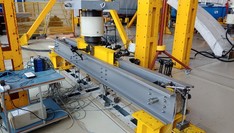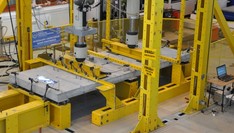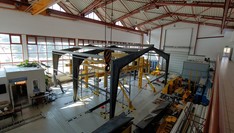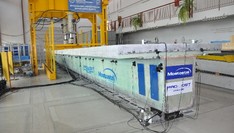The Faculty has laboratories equipped with the most modern equipment that allow to perform all necessary tests of building materials, soils, structural elements and construction models on a laboratory and real scale. In laboratories, it is possible to measure strength parameters, perform fatigue tests, test the behaviour of satructures under static and dynamic loads, measure deformations, displacements, angles of rotation and forces, as well as noise and other acoustic parameters.
The department also has a well-equipped road laboratory. The research equipment at the Faculty's disposal allows testing various properties of road materials, as well as the surface, construction layers and substrate of existing roads.
The Faculty also has measurement stations and apparatus for analysing the state of the environment. Thanks to them, it is possible to check the quality and level of physicochemical and microbiological pollutants: natural, surface and ground waters, tap water, sewage, soil, waste, bottom sediments, sewage sludge, biomass and the atmosphere.
The equipment owned by the Department also enables the control of municipal infrastructure in the field of analysis of the functioning of water supply and sewage networks (flow meters, meteorological measurement stations, equipment for monitoring and inspection of water supply, sewage and industrial networks infrastructure) and research in the field of renewable energy (analysis of a wide spectrum of physical properties of biomass and biofuels).
Service and research offer from the laboratory of the FCEEA
Individual units of the Faculty offer services to industry, business representatives and other interested parties in the following areas:
-
designing structures of all types of facilities with any degree of difficulty;
-
verification of designs and material and construction solutions;
-
periodic inspections of engineering structures;
-
carrying out construction expertise;
-
assessment of the standard and service capacity of the existing engineering structures;
-
development of repair technologies for concrete and reinforced concrete structures;
-
supervising the construction implementation;
-
preparation of maps for design purposes;
-
consulting applications for ITB technical approvals;
-
static and dynamic model studies;
-
construction elements, connections and finished construction products with the use of a universal, adjustable research system;
-
fatigue tests of building structure elements, connections, vibroinsulation, machines and devices;
-
tests of bridge structures under a static and dynamic test load;
-
periodic measurements of building displacements and deformations;
-
control measurements of cranes, bridges, viaducts and tower structures;
-
tests of acoustic conditions in buildings and in the external environment, including noise measurements from road, rail, aviation and industrial plants;
-
measurements of the effectiveness of acoustic screens;
-
specialized material tests;
-
assessment of acoustic insulation of building partitions in field conditions;
-
consultations and cooperation in the implementation of new technologies and building materials;
-
concrete design, production control, consultations and laboratory tests of concrete for its producers;
-
comprehensive problem solving regarding concrete technology, testing of binding materials, aggregates, concrete products, concretes and mortars;
-
inspections of inaccessible places in buildings, machines, installations, etc.;
-
landslide monitoring;
-
a wide range of road tests;
-
consulting, expert opinions, projects in the field of architecture and urban planning, spatial planning and conservation of monuments;
-
conducting conservation supervision over historic buildings;
-
carrying out historical studies and architectural research;
-
preparation of architectural and conservation documentation;
-
developing programs for the protection of cultural heritage;
-
analysis and assessment of risks related to the functioning of municipal systems;
-
concepts for the construction, expansion and modernization of water supply systems;
-
implementation of solutions for facilities and devices to control the flow of sewage in the sewage system;
-
implementation of liquefied soil technology for the construction of infrastructure systems;
-
implementation of the construction of multimedia chambers;
-
environmental studies of reservoirs and the impact of surface waters and their catchments on the cleanliness of these reservoirs, monitoring of surface waters;
-
bacteriological, microbiological, parasitological and physicochemical tests, incl. water, waste water, sediment and soil (e.g. heavy metal content);
-
assessment of water quality and suitability for drinking and other purposes;
-
technological research on water treatment;
-
environmental impact assessment of industrial plants, sewage treatment plants, landfills;
-
testing the suitability of sorption and ion exchange masses for operation;
-
environmental impact assessments and reports of landfills;
-
waste management in municipalities;
-
studies of changes in sediments deposited in the environment, sanitary risk assessment.









